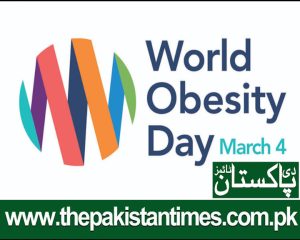
World Obesity Day highlights Pakistan’s fight against trans fatty acids (iTFA), with more than 50% of people overweight due to related diseases, as the TRANSFORM Pakistan campaign calls for management of iTFA, led by the government , to combat health problems such as cardiovascular disease.
“More than 50% of Pakistan’s population is currently overweight, leading to many harmful health problems.
This information was shared in a press release by the TRANSFORM Pakistan alliance partners on the occasion of World Obesity Day celebrated on Monday, March 4. Recent studies have shown a worrying correlation between the increasing prevalence of obesity in Pakistan and the widespread consumption of foods high in trans fats. These harmful TFAs are often found in processed and fast foods, snacks, and cooking oils.
Since last year, the TRANSFORM Pakistan campaign has been at the forefront, advocating for ITFA regulation to create a healthier and safer food landscape for all Pakistanis. Director of communications and advocacy at Pakistan Youth Advocates for Change (PYCA) World Health Organization statistics show that 58.1% of Pakistanis are classified as overweight group and 43.9% fall into the obese group. The estimated annual cost of obesity management in Pakistan was PKR 428 billion in 2015.
The main emphasized is to combat the growing obesity rate in Pakistan, it is important to address the root causes of this epidemic. “There is a strong link between the increasing prevalence of obesity and the prevalence of industrially produced trans fatty acids in food sources Dr. Saba Amjad, CEO of Heartfile. Pakistani products”. Munawar Hussain, national coordinator of the Global Health Advocacy Incubator . These harmful substances are linked to a range of health problems, including obesity, cardiovascular disease and other metabolic disorders.
One of the most important measures to curb the rising tide of obesity and related diseases in Pakistan is to introduce a government-mandated regulatory framework. Mukhtar Ahmed, executive director of the Center for Peace and Health Initiatives emphasized that such a framework must ensure that the prevalence of iTFA in all food products is limited. at 2% or less of their total fat content.”The Ministry of National Health Services, Regulations and Coordination (MoNHR&C), which is also a sponsor of the Pakistan TRANSFORM campaign, has been actively collaborating with various stakeholders, including the Standards and Monitoring Authority Pakistan (PSQCA), to ensure that a mandatory mechanism is led by the government. Standards will be released soon. Dr. Khawaja Masuood Ahmed, Coordinator of the National Alliance for Nutrition and Fortification at MoNHSR&C, explains By 2023, Pakistan has successfully managed ITFA content in several food sources, including oils food, Vanaspati ghee, thickener in breads and baked goods.
However, we know that many notable food products, such as processed products, dairy products such as chocolate and ice cream, as well as street foods, remain outside the scope of the regulation. this decision. MoNHR&C is committed to ensuring that all food products across Pakistan are soon brought under uniform regulation to limit the prevalence of TFA in our food sources.
TRANSFORM Pakistan Campaign calls on individuals, communities and policymakers to take action to adapt ITFA to Pakistani diets, with the aim of reducing non communicable diseases and the impact of obesity Obesity on public health indicators.
Sub Editor : Ghufran